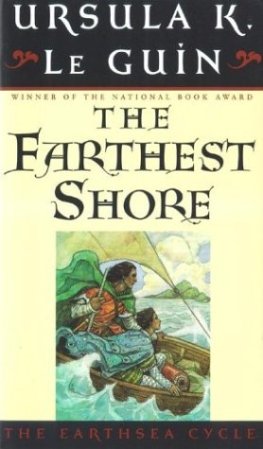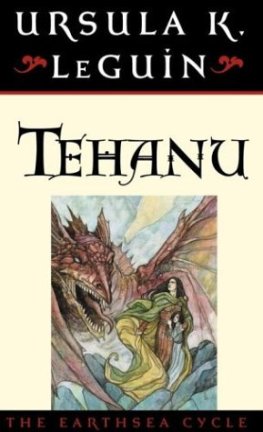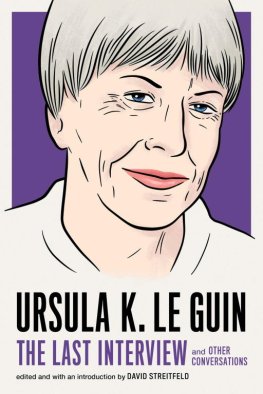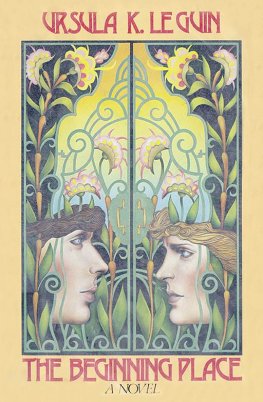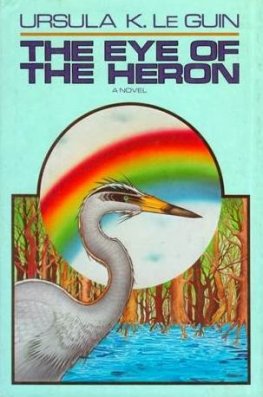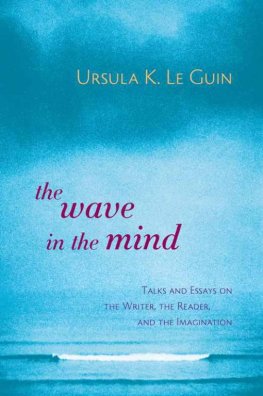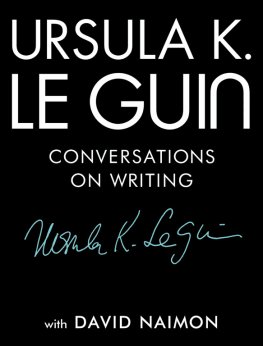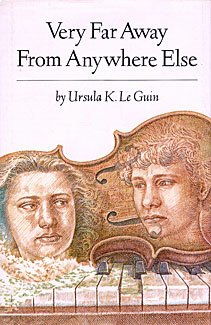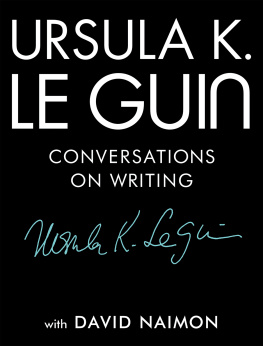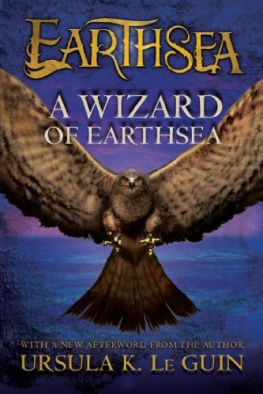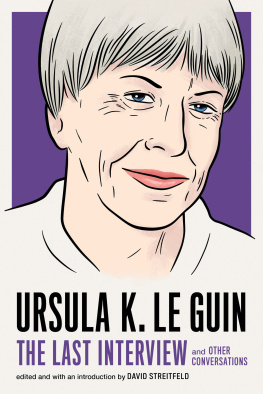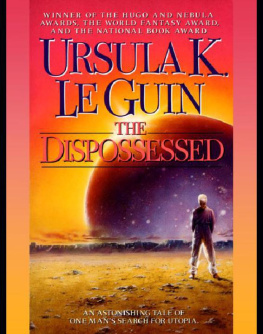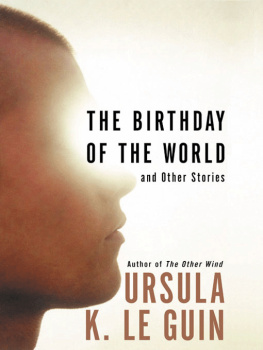Ursula Le Guin - The Barrow
Here you can read online Ursula Le Guin - The Barrow full text of the book (entire story) in english for free. Download pdf and epub, get meaning, cover and reviews about this ebook. genre: Romance novel. Description of the work, (preface) as well as reviews are available. Best literature library LitArk.com created for fans of good reading and offers a wide selection of genres:
Romance novel
Science fiction
Adventure
Detective
Science
History
Home and family
Prose
Art
Politics
Computer
Non-fiction
Religion
Business
Children
Humor
Choose a favorite category and find really read worthwhile books. Enjoy immersion in the world of imagination, feel the emotions of the characters or learn something new for yourself, make an fascinating discovery.

- Book:The Barrow
- Author:
- Genre:
- Rating:3 / 5
- Favourites:Add to favourites
- Your mark:
- 60
- 1
- 2
- 3
- 4
- 5
The Barrow: summary, description and annotation
We offer to read an annotation, description, summary or preface (depends on what the author of the book "The Barrow" wrote himself). If you haven't found the necessary information about the book — write in the comments, we will try to find it.
The Barrow — read online for free the complete book (whole text) full work
Below is the text of the book, divided by pages. System saving the place of the last page read, allows you to conveniently read the book "The Barrow" online for free, without having to search again every time where you left off. Put a bookmark, and you can go to the page where you finished reading at any time.
Font size:
Interval:
Bookmark:
Ursula K. le Guin
The Barrow
Night came down along the snowy road from the mountains. Darkness ate the village, the stone tower of Vermare Keep, the barrow by the road. Darkness stood in the corners of the rooms of the Keep, sat under the great table and on every rafter, waited behind the shoulders of each man at the hearth.
The guest sat in the best place, a corner seat projecting from one side of the twelve-foot fireplace. The host, Freyga, Lord of the Keep, Count of the Montayna, sat with everybody else on the hearth-stones, though nearer the fire than some. Cross-legged, his big hands on his knees, he watched the fire steadily. He was thinking of the worst hour he had known in his twenty-three years, a hunting trip, three autumns ago, to the mountain lake Malafrena. He thought of how the thin barbarian arrow had stuck up straight from his fathers throat; he remembered how the cold mud had oozed against his knees as he knelt by his fathers body in the reeds, in the circle of the dark mountains. His fathers hair had stirred a little in the lake-water. And there had been a strange taste in his own mouth, the taste of death, like licking bronze. He tasted bronze now. He listened for the womens voices in the room overhead.
The guest, a traveling priest, was talking about his travels. He came from Solariy, down in the southern plains. Even merchants had stone houses there, he said. Barons had palaces, and silver platters, and ate roast beef. Count Freygas liege men and servants listened open-mouthed. Freyga, listening to make the minutes pass, scowled. The guest had already complained of the stables, of the cold, of mutton for breakfast dinner and supper, of the dilapidated condition of Vermare Chapel and the way Mass was said thereArianism! he had muttered, sucking in his breath and crossing himself. He told old Father Egius that every soul in Vermare was damned: they had received heretical baptism. Arianism, Arianism! he shouted. Father Egius, cowering, thought Arianism was a devil and tried to explain that no one in his parish had ever been possessed, except one of the counts rams, who had one yellow eye and one blue one and had butted a pregnant girl so that she miscarried her child, but they had sprinkled holy water on the ram and it made no more trouble, indeed was a fine breeder, and the girl, who had been pregnant out of wedlock, had married a good peasant from Bara and borne him five little Christians, one a year. Heresy, adultery, ignorance! the foreign priest had railed. Now he prayed for twenty minutes before he ate his mutton, slaughtered, cooked, and served by the hands of heretics. What did he want? thought Freyga. Did he expect comfort, in winter? Did he think they were heathens, with his Arianism? No doubt he had never seen a heathen, the little, dark, terrible people of Malafrena and the farther hills. No doubt he had never had a pagan arrow shot at him. That would teach him the difference between heathens and Christian men, thought Freyga.
When the guest seemed to have finished boasting for the time being, Freyga spoke to a boy who lay beside him chin in hand: Give us a song, Gilbert. The boy smiled and sat up, and began at once in a high, sweet voice:
King Alexander forth he came,
Armored in gold was Alexander,
Golden his greaves and great helmet,
His hauberk all of hammered gold.
Clad in gold came the king,
Christ he called on, crossing himself,
In the hills at evening,
Forward the army of King Alexander
Rode on their horses, a great host,
Down to the plains of Persia
To kill and conquer, they followed the King,
In the hills at evening.
The long chant droned on; Gilbert had begun in the middle and stopped in the middle, long before the death of Alexander in the hills at evening. It did not matter; they all knew it from beginning to end.
Why do you have the boy sing of pagan kings? said the guest.
Freyga raised his head. Alexander was a great king of Christendom.
He was a Greek, a heathen idolator.
No doubt you know the song differently than we do, Freyga said politely. As we sing it, it says, Christ he called on, crossing himself.
Some of his men grinned.
Maybe your servant would sing us a better song, Freyga added, for his politeness was genuine. And the priests servant, without much urging, began to sing in a nasal voice a canticle about a saint who lived for twenty years in his fathers house, unrecognized, fed on scraps. Freyga and his household listened in fascination. New songs rarely came their way. But the singer stopped short, interrupted by a strange, shrieking howl from somewhere outside the room. Freyga leapt to his feet, staring into the darkness of the hall. Then he saw that his men had not moved, that they sat silently looking up at him. Again the faint howl came from the room overhead. The young count sat down. Finish your song, he said. The priests servant gabbled out the rest of the song. Silence closed down upon its ending.
Winds coming up, a man said softly.
An evil winter its been.
Snow to your thighs, coming through the pass from Malafrena yesterday.
Its their doing.
Who? The mountain folk?
Remember the gutted sheep we found last autumn? Kass said then it was an evil sign. Theyd been killing to Odne, he meant.
What else would it mean?
What are you talking about? the foreign priest demanded.
The mountain folk, Sir Priest. The heathen.
What is Odne?
A pause.
What do you mean, killing to Odne?
Well, sir, maybe its better not to talk about it.
Why?
Well, sir, as you said of the singing, holy things are better, tonight. Kass the blacksmith spoke with dignity, only glancing up to indicate the room overhead; but another man, a young fellow with sores around his eyes, murmured, The Barrow has ears, the Barrow hears
Barrow? That hillock by the road, you mean?
Silence.
Freyga turned to face the priest. They kill to Odne, he said in his soft voice, on stones beside the barrows in the mountains. Whats inside the barrows, no man knows.
Poor heathen men, unholy men, old Father Egius murmured sorrowfully.
The altarstone of our chapel came from the Barrow, said the boy Gilbert.
What?
Shut your mouth, the blacksmith said. He means, sir, that we took the top stone from the stones beside the Barrow, a big marble stone, Father Egius blessed it and theres no harm in it.
A fine altarstone, Father Egius agreed, nodding and smiling, but on the end of his words another howl rang out from overhead. He bent his head and muttered prayers.
You pray too, said Freyga, looking at the stranger. He ducked his head and began to mumble, glancing at Freyga now and then from the corner of his eye.
There was little warmth in the Keep except at the hearth, and dawn found most of them still there: Father Egius curled up like an aged dormouse in the rushes, the stranger slumped in his chimney corner, hands clasped across his belly, Freyga sprawled out on his back like a man cut down in battle. His men snored around him, started in their sleep, made unfinished gestures. Freyga woke first. He stepped over the sleeping bodies and climbed the stone stairs to the floor above. Ranni the midwife met him in the ante-room, where several girls and dogs were sleeping in a heap on a pile of sheepskins. Not yet, count.
But its been two nights now
Ah, shes hardly begun, the midwife said with contempt. Has to rest, hasnt she?
Freyga turned and went heavily down the twisted stairs. The womans contempt weighed upon him. All the women, all yesterday; their faces were stern, preoccupied; they paid no attention to him. He was outside, out in the cold, insignificant. He could not do anything. He sat down at the oaken table and put his head in his hands, trying to think of Galla, his wife. She was seventeen; they had been married ten months. He thought of her round white belly. He tried to think of her face but there was nothing but the taste of bronze on his tongue. Get me something to eat! he shouted, bringing his fist down on the board, and the Tower Keep of Vermare woke with a jump from the grey paralysis of dawn. Boys ran about, dogs yelped, bellows roared in the kitchen, men stretched and spat by the fire. Freyga sat with his head buried in his hands.
Font size:
Interval:
Bookmark:
Similar books «The Barrow»
Look at similar books to The Barrow. We have selected literature similar in name and meaning in the hope of providing readers with more options to find new, interesting, not yet read works.
Discussion, reviews of the book The Barrow and just readers' own opinions. Leave your comments, write what you think about the work, its meaning or the main characters. Specify what exactly you liked and what you didn't like, and why you think so.

